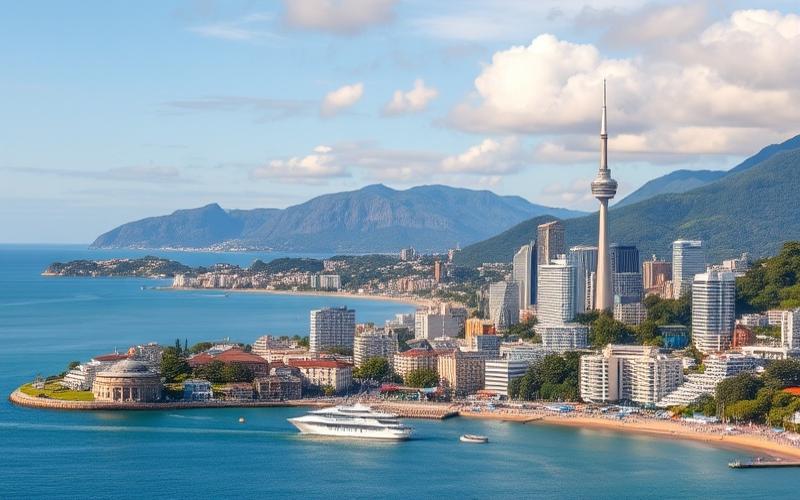
 Published on and written by Cyril Jarnias
Published on and written by Cyril Jarnias
Russia’s invasion of Ukraine has triggered a cascade of economic uncertainties worldwide, and New Zealand is no exception. Though located thousands of kilometers from the conflict, the country is experiencing repercussions in its dynamic real estate market. The unexpected impact of this international conflict has placed unforeseen pressure on both local investors and foreign buyers, making real estate sector analysis more complex than ever. Fluctuations in construction material prices, combined with uncertain monetary policies, raise fundamental questions about the resilience of the New Zealand market in the face of external geopolitical shocks.
Geopolitical Repercussions of the Ukraine War on New Zealand’s Real Estate Market
The imposition of international sanctions against Russia starting in 2022 altered global capital flows and indirectly impacted New Zealand’s real estate market, particularly through movements of foreign investments seeking safe havens.
Russian and Ukrainian Capital Flows to New Zealand
- Following restrictions on Russian assets in the European Union, United Kingdom, and North America, some private capital from Russia (and to a lesser extent Ukraine) sought to move to jurisdictions deemed politically stable, including New Zealand.
- New Zealand has historically attracted certain wealthy profiles as a “safe haven” due to its economic stability, strong institutions, and predictable legal system.
- However, these flows remain marginal compared to Asian or Australian investments. Increased scrutiny on fund origins (anti-money laundering) limited massive influx but did not prevent some discreet transactions in high-end residential or rural properties.
Evolution of Real Estate Demand
- Foreign demand remained contained compared to the speculative boom observed until 2021; however, some significant transactions involved Eastern European buyers seeking asset security or migration backup plans.
- This phenomenon mainly affected the luxury/high-end segment as well as isolated rural properties.
- Overall, since 2023–2024, more buyers have been observed at property viewings, though this resurgence primarily concerns local residents.
Effects on Real Estate Prices
| Year | Median House Value (NZD) | Price/Median Income Ratio |
|---|---|---|
| Late 2021 | >10 times | |
| December 2024 | 804,366 | 7.3 |
Pressures exerted by certain foreign investors remained marginal compared to local structural trends. After a peak in 2021 linked to the pandemic followed by a marked decline in 2022–23:
- The market remains tight but shows notable improvement in affordability since late 2019 thanks to:
- relative price decrease
- increase in median income
- recent reduction in average credit cost
Government Policies and Recent Interventions
The New Zealand government implemented several measures to address this new situation:
- Temporary easing regarding certain foreign investments to attract funds while maintaining strict control through enhanced verification (“Overseas Investment Act”).
- Gradual introduction starting mid-2025 of the DTI (Debt-to-Income) cap, limiting borrowable amounts to prevent any speculative bubble fueled by external money.
- Targeted programs aimed at rapidly increasing rental supply (“build-to-rent”), with tax incentives for qualified domestic or international institutional investors.
Consequences on the Construction/Materials Sector
The war in Ukraine and sanctions against Russia had several indirect effects:
- Significant fluctuations in the international cost of imported materials (steel, aluminum…), exacerbated by global logistical disruptions
- Widespread increase in budget costs for any new project or major renovation
- Additional costs partially passed on to the end consumer in the form of higher prices
- Temporary slowdown or postponement of many private/collective construction sites between late 2022–mid 2024
| Geopolitical Effect | Direct Impact NZ Real Estate/Construction |
|---|---|
| Anti-Russia Sanctions | Selective redirection of high-end capital flows |
| Ukraine War/Logistics | Increase in material/import costs |
| Energy Volatility | Increase in construction site operational charges |
In this unstable global context but conducive to national real estate strategic repositioning:
New Zealand remains attractive as a discreet, well-regulated financial refuge; nevertheless, it is gradually strengthening its regulatory arsenal to preserve local accessibility and the structural health of the residential market.
Good to Know:
International sanctions imposed on Russia have prompted some Russian and Ukrainian investors to move their capital to markets deemed safer, such as New Zealand’s, contributing to increased demand for properties in certain regions of the country. This influx has exerted pressure on real estate prices, particularly in areas favored by foreigners. In response, the New Zealand government has implemented policies to regulate non-resident access to properties and ensure affordable housing for local citizens. Furthermore, the construction sector, already impacted by the pandemic, has also felt the effects of supply chain disruptions, exacerbated by the war in Ukraine, leading to increased construction costs and delays. These dynamics highlight the global interconnectedness of markets and the importance for real estate players to adopt a reactive and informed strategy in the face of geopolitical developments.
The Impact of Ukrainian Refugee Influx on Housing in New Zealand
Since the start of the war in Ukraine, approximately 1,500 special visas have been granted by New Zealand to Ukrainian refugees under a policy created in 2022. This figure represents the majority of official arrivals of Ukrainian refugees in the country.
Main Government Measures Implemented:
- Creation of a special temporary visa for Ukrainians fleeing the war.
- Possibility of access to permanent resident status without language test, proof of funds, or sponsorship requirement for those arriving before March 15 of the following year.
- Simplified administrative procedure to provide stability and certainty to the individuals concerned.
Mainly Affected Regions:
Major cities like Auckland and Wellington host the majority of new arrivals, due to their infrastructure and social services offerings. These regions were already facing high pressure on their real estate markets.
| Region | Estimated Arrivals | Pre-existing Real Estate Situation |
|---|---|---|
| Auckland | Majority | Limited supply, high prices |
| Wellington | Numerous cases | Growing rental tension |
Impact on the Local Real Estate Market:
- The arrival of refugees has increased demand for affordable housing in these urban centers.
- Rental availability has slightly decreased in some neighborhoods favored by new arrivals.
- Average purchase prices have not experienced a sudden rise solely due to this limited influx; however, competition has increased in certain segments of the rental stock (studios/family apartments).
Testimonials Collected from Refugees:
“We were well received but it is difficult to find stable and affordable housing; many have to share with several families or accept significant distance from the city center.”
“The administrative process to obtain social housing is long and we don’t always understand all the local rules.”
Real Estate Expert Perspectives:
Professionals estimate that the direct impact remains moderate given the relatively small number of arrivals compared to the total New Zealand population. However:
- The influx adds to existing tensions caused by rapid overall population growth.
- If this pace continues or increases (particularly if more visas are granted), it may become necessary to substantially increase social or intermediate supply to avoid a lasting increase in urban rents.
Recent statistics used:
Approximately 1,500 special visas granted since early 2022; expanded access to permanent status announced mid-2023; persistent tension on urban real estate markets even before this recent influx.
Good to Know:
Since the start of the war in Ukraine, approximately 1,500 Ukrainian refugees have found refuge in New Zealand, primarily in major cities like Auckland and Wellington. The New Zealand government has implemented temporary housing assistance measures, combined with subsidies to facilitate access to affordable housing, which temporarily alleviated pressure on the already tight real estate market. However, the sudden arrival of these refugees has led to an increase in demand, causing a rise in rental prices in some regions. Despite emergency policies, refugees report difficulties in finding permanent housing suitable for their family needs. According to sector experts, this influx could exacerbate existing imbalances in the real estate market, but also encourage an increase in social housing construction in the long term. Recent studies suggest that without an increase in housing supply, prices will continue to climb, putting additional pressure on New Zealand tenants.
Foreign Investments in New Zealand: A Post-Ukraine Conflict Geopolitical Perspective
Since the outbreak of the Ukraine conflict, foreign investment flows have seen significant redirection towards regions perceived as politically stable and economically resilient. New Zealand, thanks to its political stability, robust institutions, and geographical distance from tension zones, has emerged as a preferred destination for international capital.
Redirection of Post-Conflict Investment Flows
- International investors seek to limit their exposure to increased geopolitical risk in Eastern Europe by favoring markets deemed safer.
- In 2024 and early 2025, New Zealand saw its foreign direct investments (FDI) increase notably: +2.77 billion NZD in the last quarter of 2024 and +3.95 billion NZD in the first quarter of 2025. This rebound occurred while global FDI fell by 11% over the same period.
- This trend confirms a relative shift of flows towards the Asia-Pacific region — from which New Zealand benefits.
Bilateral Relations and EU–New Zealand Dynamics
- After the Ukraine conflict, economic cooperation between New Zealand and certain EU member countries intensified around agreements aimed at securing strategic supply chains (agri-food, clean technologies).
- The appeal of the New Zealand market for European investors is explained by a stable regulatory environment as well as the tightening or relative loss of attractiveness of certain traditional markets affected by instability.
- Several European funds have strengthened their presence in the New Zealand technology sector since late 2022.
Beneficiary Real Estate Sectors & Impact on Housing
The following sectors particularly benefited:
| Sector | Nature of Investments | Observed Effects |
|---|---|---|
| Residential Real Estate | Acquisition of high-end homes | Rise in average prices (+12% in main urban areas between Q1/23-Q1/25), increased pressure on rental stock availability |
| Commercial Real Estate | Office/logistics development | Vibrant new construction but rising rents in some cities |
| Alternative Housing | Student/senior residences | Diversification of supply but persistent tension on affordable housing |
Increased demand has exacerbated the pre-existing housing crisis: relative scarcity in some metropolitan areas (Auckland/Wellington), amplified real estate inflation for local first-time buyers.
New Zealand Government Post-Conflict Policies
To meet international expectations while controlling local impact:
- Major modernization starting April 2025 of the “investor visa” program with simplified rules:
- Minimum investment lowered starting from 10 million NZD over five years.
- Expansion to green bonds/innovative projects.
- Accelerated procedure for qualified talents associated with these capitals.
- Stated intention to attract not only financial capital but also foreign entrepreneurial expertise; goal: stimulate local innovation without worsening existing socio-economic imbalances.
This policy explicitly aims to counter the decline observed over the past two years after a previous tightening that drastically reduced new investments via this channel (70 M NZD invested under AIP since mid-2022 compared to over 2 billion previously).
Enhanced International Perception Following European Tensions
- The Ukraine crisis has reinforced among global institutional investors the traditional positive image associated with New Zealand: affirmed diplomatic neutrality; predictable governance; low corruption; macroeconomic resilience despite adverse global context.
- For some financial experts — particularly from the Anglo-Saxon world — this perception is now consensus among those seeking diversification outside exposed Euro-Atlantic zones.
In summary, if the post-conflict context caused a historic global decline in worldwide FDI (-11% in 2024), it simultaneously consolidated New Zealand’s specific attractiveness among players seeking legal security and political stability. This dynamic is expected to persist as long as marked geopolitical volatility persists elsewhere.
Good to Know:
Since the Ukraine conflict, foreign investment flows have redirected towards regions perceived as more stable, such as New Zealand, where bilateral relations with European countries have strengthened, leading to a notable increase in investments, primarily in the real estate sector. Real estate prices have thus experienced a significant rise, particularly in major cities like Auckland and Wellington, reducing the availability of affordable housing. The adoption of New Zealand policies favorable to foreign investments, such as eased tax agreements and simplified administrative procedures, played a crucial role in this dynamic, reinforcing New Zealand’s perception as a preferred destination for capital seeking security. Recent expert analyses show that foreign investments in real estate increased by 15% in 2022, with notable influence from European investors, highlighting a strategic realignment of portfolios towards economies less exposed to geopolitical tensions.
Disclaimer: The information provided on this website is for informational purposes only and does not constitute financial, legal, or professional advice. We encourage you to consult qualified experts before making any investment, real estate, or expatriation decisions. Although we strive to maintain up-to-date and accurate information, we do not guarantee the completeness, accuracy, or timeliness of the proposed content. As investment and expatriation involve risks, we disclaim any liability for potential losses or damages arising from the use of this site. Your use of this site confirms your acceptance of these terms and your understanding of the associated risks.














































